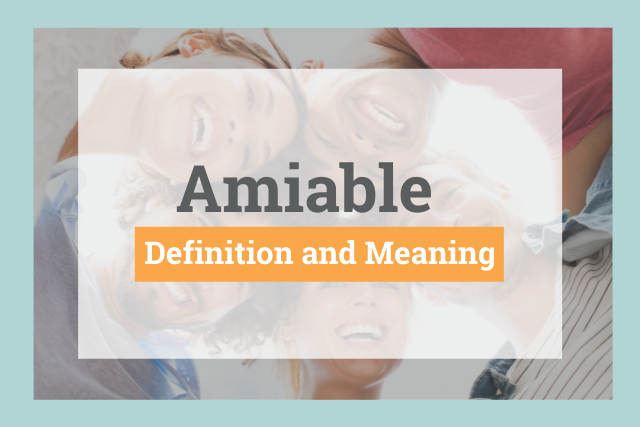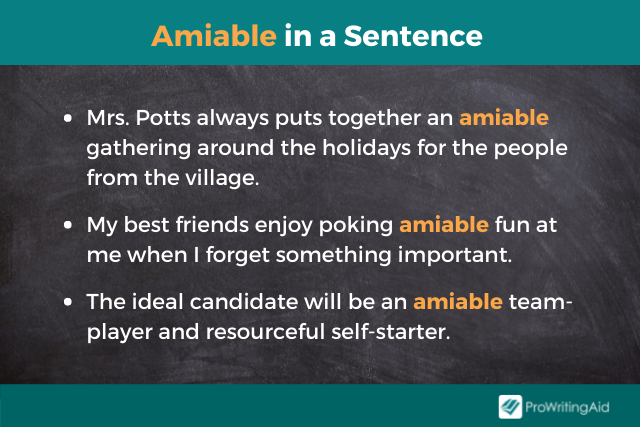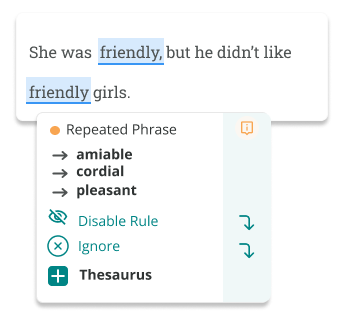
If someone describes you as amiable, it’s definitely a compliment! But what does amiable mean? Let’s dive into the definition and meaning of this excellent trait.
What Does Amiable Mean?
Amiable is an adjective that means “to have an easygoing and cheerful disposition or a pleasant or agreeable nature.” Typically, amiable describes a person’s demeanor. However, it can also be used to mean good-natured and describe other nouns.
For example, various reviewers have used the term "amiable modern fairytale" to describe films like Sydney White, Coming to America, and Gu Gu the Cat.

You might know an amiable man who gives you an amiable greeting. Maybe you roast your siblings in amiable fun.
However the adjective is used, it denotes a playful, light-hearted, or cheery mood.
Synonyms for Amiable
In addition to words like easygoing or pleasant, here are some other synonyms for amiable:
- affable
- charming
- good-humored
- cordial
- friendly
- genial
- congenial
- convivial
- jovial
- sweet
All of these synonyms for amiable tell us the same thing: an amiable person is the type of person we want to be friends with!

What Is the Definition of Amiable?
Now that we know what amiable means and the connotations it has, let’s look at what the dictionary entry says. Here is the Merriam-Webster definition of amiable: "friendly, social, and congenial; generally agreeable."
Amiability and amiableness are the noun forms of amiable, and the adverb form is amiably.
What Is the Origin of the Word Amiable?
Amiable is an old word, with its root from the Late Latin amīcābilis. This word meant friendly and is derived from the Latin word amare for to love.
Amiable joined the English language all the way back in the Middle Ages, sometime in the 14th century! Originally, amiable meant pleasing or admirable.
Over time, it evolved into a synonym for a friendly, cheerful disposition, although the original definitions are not all that far removed from the current ones. And if you ask us, an amiable person is admirable!
Examples of Amiable in a Sentence

The best way to learn what an unfamiliar word means is to see it in action. Here are several example sentences with amiable.
- The reunion was an amiable gathering full of laughter, memories, and good food.
- I love stories with an amiable villain rather than someone truly evil.
- The man I met for dinner was amiable enough, but I don’t think we had any real chemistry.
- We are hiring a nanny who is amiable, reliable, and intelligent.
- My boss has an amiable disposition most days, but she is grumpy when there’s a major deadline looming.
- Mrs. Potts always puts together an amiable gathering around the holidays for the people from the village.
- My best friends enjoy poking amiable fun at me when I forget something important.
- The ideal candidate will be an amiable team-player and resourceful self-starter.
Spice up your writing by replacing a common word like friendly or cheerful with amiable. What sentences can you create with this word? You don’t have to remember the synonyms yourself either, ProWritingAid will highlight overused words and suggest replacements.

Spice up your writing with a free ProWritingAid account.
Examples of Amiable in Literature
Amiable has been used in English literature for centuries. We’ve listed some of our favorite examples below.
- “You will do well to send a note to your amiable friend Carr; it may save him a useless journey; for at my table he shall not sit. Now you know, Val.”—Elster’s Folly by Mrs. Henry Wood
- “Once upon a time there was a Queen who had a son so ugly and so misshapen that it was long disputed whether he had human form. A fairy who was at his birth said, however, that he would be very amiable for all that, since he would have uncommon good sense.”—Riquet with the Tuft by Charles Perrault
- “Her great merit is finding out mine—there is nothing so amiable as discernment.”—Letter to John Murray from Lord Byron
- “‘This will probably be the case,’ he replied; ‘and yet there is something so amiable in the prejudices of a young mind, that one is sorry to see them give way to the reception of more general opinions.’”—Sense and Sensibility by Jane Austen
- “I’d be lying if I claimed that, in spite of our amiable afternoons, I don’t have an ache somewhere in my heart that my children will not be playing Carnegie Hall anytime soon.”—Sympathy for the Tiger Moms by Sandra Tsing Loh
- “How easy to be amiable in the midst of happiness and success.”—William Ellery Channing
These are just a few great quotes with the word amiable, but there are many more!
What’s the Difference Between Amiable and Amicable?
Amiable and amicable are two words that get easily confused. They’re only one letter apart. To make matters more confusing, they have similar meanings. However, they are not direct synonyms.
Amicable means “polite and friendly with the purpose of avoiding disagreement.” It generally refers to a conflict between two or more individuals or groups that is done peacefully. An amicable agreement might be friendly, but not effusively so.
Amiable, on the other hand, is an adjective to describe a cheerful disposition or manner. It’s more than politeness, and it usually describes an individual person. It doesn’t involve a disagreement or argument in the same way that amicable does.
It’s easy to get them confused but that’s where ProWritingAid comes in. Use ProWritingAid’s thesaurus feature to ensure you’re always using the correct word. Just double-click on a word in the editor to see its synonyms.
Gain access to thousands of synonyms with a free ProWritingAid account.
Let’s Recap: Amiable Meaning
Amiable is an adjective that describes a persons demeanor. In this context it means to have an easy-going disposition. Amiable can also be used to describe other nouns such as a greeting or a joke. Succinctly, it denotes a playful, light-hearted, or cheery mood.
It is not to be confused with amicable, which refers to friendliness or benevolence between two or more people or groups.


